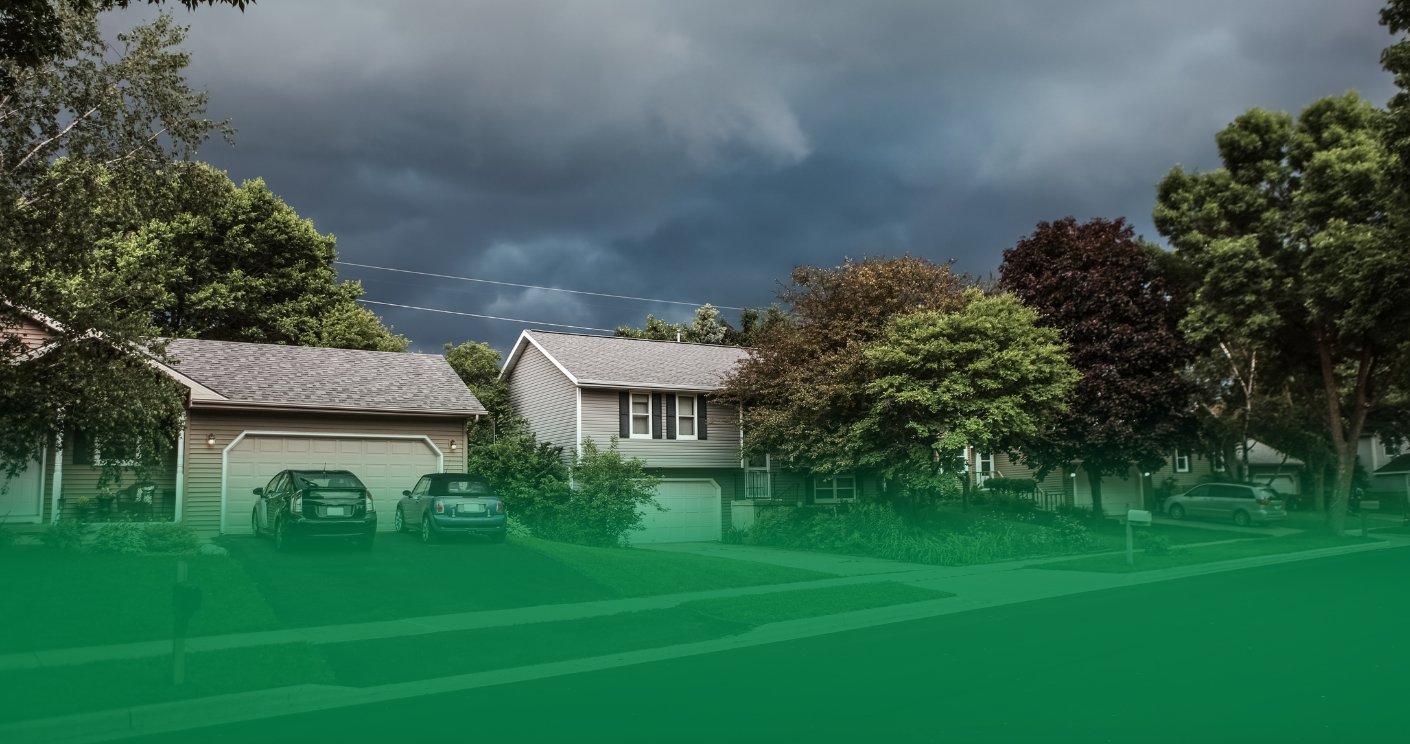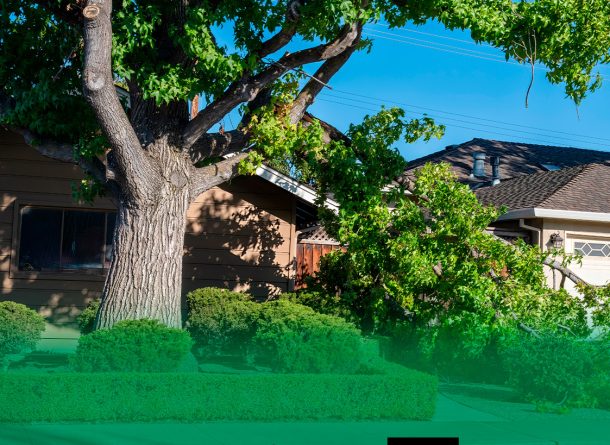05/01/2024
Hurricanes are powerful tropical storms that can hit coastal regions with destructive winds, heavy rainfall, and flooding. McAllen usually experiences fewer direct impacts from these storms than coastal regions. However, the damage can still be significant.
So, it is important to secure your home and belongings to prepare for the hurricane season. Taking proactive steps to prepare can safeguard your property, minimize damage, and ensure safety.
During the hurricane season, it is important to be aware of upcoming storms and be alert for Emergency Alert Systems (EAS) notifications and Wireless Emergency Alerts (WEA). These will broadcast major storm or emergency information through television, radio, and mobile phones.
In this article, we will help you prepare your home for hurricane season in McAllen. Let’s get started.
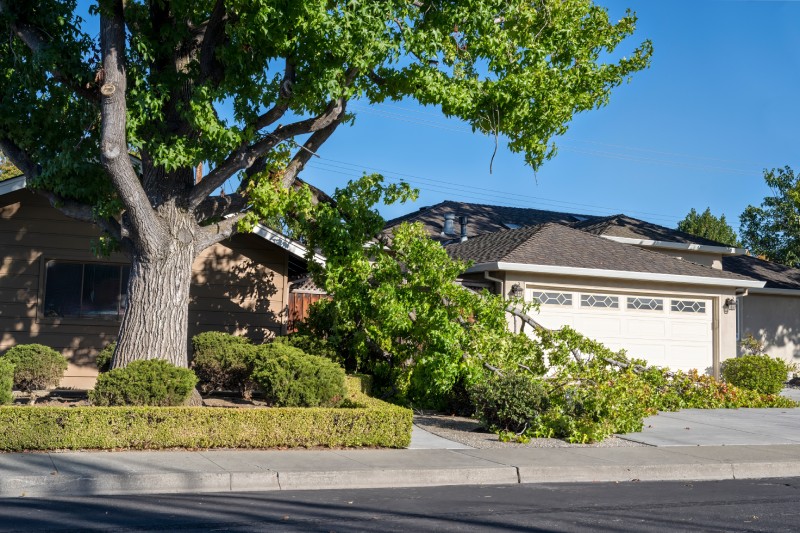
Perform A Risk Assessment
To begin, conducting a thorough risk assessment of your home and surroundings is crucial. McAllen’s location in the Gulf Coast region puts it at risk of powerful hurricanes, heavy rainfall, and destructive winds. McAllen’s Severe Wind Factor™ risk is determined by the probability and intensity of hurricane, tornado, or severe storm winds impacting the area.
Flooding is also another concern, especially if your house is in a low-lying area or near bodies of water.
As a homeowner, you should understand your property’s flood and storm damage risk. You should also look out for vulnerabilities like a weak roof, old windows, and an inadequate drainage system. Understanding these vulnerabilities can help you find ways to fortify your home to protect it from extensive damage. So, how do you do that? Let’s find out.
Take Proactive Steps to Prepare for Your Home
There are several measures that you can take to protect your home from damage in the event of a hurricane:
Roof Reinforcements
The roof usually sustains the most damage during a hurricane, as it is most exposed to the wind and rain. Missing shingles, leaks, and sagging are common occurrences that you may face after a storm.
To prevent or minimize roof damage from a storm, you should have your roof inspected by a professional. Also, consider installing hurricane straps for added reinforcement.
Here’s what you can do:
- Inspection: Call a professional to assess your roof for damage and signs of wear and tear. Look out for loose or missing shingles, damaged flashing, and areas prone to leaks.
- Shingle Reinforcement: Make sure that all the shingles are securely fastened to prevent them from blowing away. Consider using hurricane clips or nails that are specifically designed for strong winds.
- Hip and Ridge Reinforcement: Strengthen vulnerable areas of the roof, like hips and ridges, with additional nails, screws, or hurricane straps for added stability.
- Debris Mitigation: Remove loose objects from your roof, such as antennas or decorations, as they can become dangerous projectiles in strong winds.
- Seal Cracks: Search for holes and cracks all around the roof and seal them properly. This will prevent water from entering the roof structure and causing it to collapse during the storm.
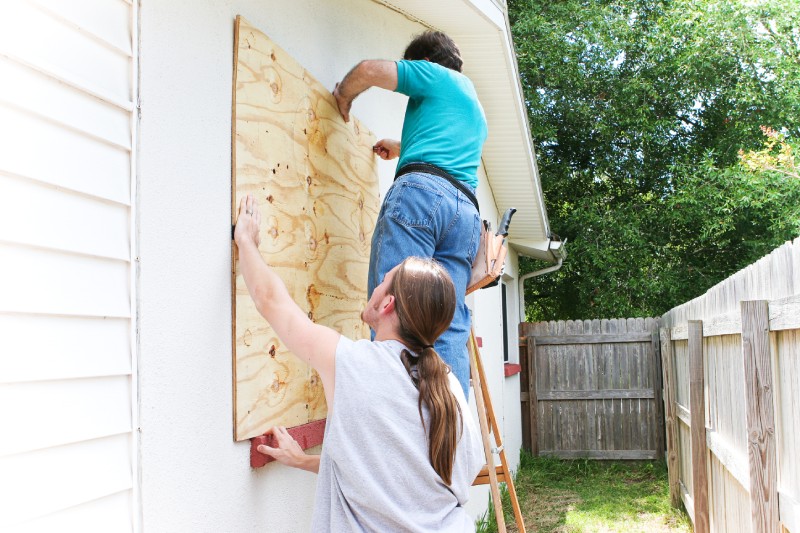
Secure Your Doors and Windows
During hurricanes, doors and windows are also very vulnerable to damage, particularly from flying objects like debris and from water leaking into the home.
To protect your home, consider taking the following steps:
- Storm Shutters: Install storm shutters to provide strong protection against high winds and flying objects. If shutters are not a feasible option for you, then opt for impact-resistant window coverings.
- Plywood Covering: If storm shutters are out of your budget, you can cover your windows and doors with plywood to create a barrier against debris. Also, seal any gaps with caulk to prevent water infiltration.
Secure Outdoor Items
If you have outdoor items, you will have to secure them to keep them from becoming dangerous projectiles that can damage your property. Make sure that structures like carports and sheds are properly fastened and securely anchored.
If you have other items, such as patio furniture, grills, and plants, remember to bring them inside before the storm hits to avoid potential damage.
Prepare an Emergency Kit
Preparation for the aftermath of the hurricane is just as important as preparing for the onslaught of it.
Usually, in the event of a hurricane, there is a chance of extended power outages, and getting immediate medical aid can be challenging. So, in such cases, you should be prepared with an emergency kit.
- When building an emergency kit, it is essential to include items like a radio, flashlights, spare batteries, a charged cell phone with a backup battery, tools to turn off utilities, a fire extinguisher, and essential documents in waterproof bags. Stock up on cash, first aid supplies, medications, mosquito repellent, bottled water, non-perishable foods, and pet supplies.
- In the aftermath of a hurricane, you should keep in mind how you’ll prepare your food without power. A tip you can remember is that you can utilize a barbecue grill if you have one. Also, stock up on extra gasoline for a generator and ensure your car has a full tank of gas in case local gas stations lose power.
Regularly update your emergency kit before each hurricane season, and store it in a known, accessible location. Being well-prepared can make all the difference in weathering the aftermath of a hurricane safely and comfortably.
Clear Outdoor Obstructions
To protect your property and surrounding areas during a hurricane, it’s crucial to assess and manage your landscaping. Trim branches near your home to prevent them from falling and causing damage. Identify and remove dead, dying, or weak trees and limbs, prioritizing those closest to your house.
If you are unsure, hire a professional arborist for safe pruning. Additionally, clear gutters and downspouts of debris to maintain proper drainage and prevent water buildup as it can help to avoid flooding.
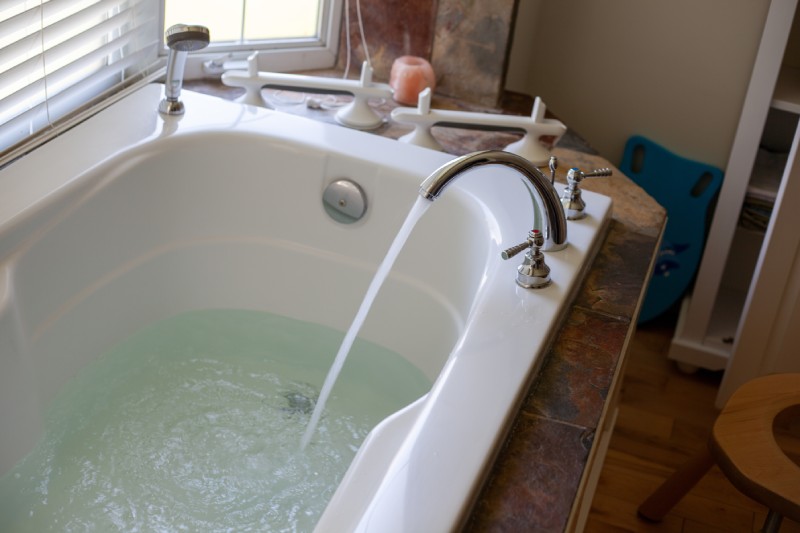
Fill Tubs and Freeze Water Bags
In the aftermath of a hurricane, it is common for the water supply to be disrupted, posing potential health hazards due to contaminated or unsafe water sources. Consuming contaminated water can lead to serious health issues, including gastrointestinal infections and waterborne diseases. Therefore, taking proactive measures to store clean water is crucial for safeguarding against such risks during and after a hurricane.
To avoid a shortage of water, you can store water in various ways. One effective method is filling bathtubs, making sure there is a reserve for flushing toilets when regular water sources are unavailable.
Additionally, freezing quart-size bags of water serves a dual purpose: preserving perishable food items by keeping them cold in the event of a power outage and providing a source of safe drinking water if contamination occurs.
Prepare Sandbags
Preparing sandbags can be invaluable for protecting your home from water damage during a hurricane. When properly placed, they serve as a barrier and direct water away from vulnerable areas of your home.
To maximize their effectiveness, it is essential to overlap the sandbags and stack them in a pyramid-like formation, creating a wide base for stability. This arrangement helps to distribute the weight evenly and prevent the bags from shifting or collapsing under pressure.
Additionally, placing sandbags strategically around doors, windows, and other entry points can create a watertight seal, further enhancing your home’s resilience against flooding.
Switch Off Utilities
Turning off gas, electricity, and water before a storm hits is a critical safety measure that helps reduce the risk of accidents and damage to your home. Gas leaks, electrical fires, and water leaks can all pose significant hazards during a hurricane or severe storm.
By shutting off these utilities in advance, you can minimize the likelihood of dangerous incidents occurring.
Knowing where the shut-off points are in your house before an emergency occurs is essential for swift and effective action. Familiarize yourself and other members of the home with the location of the gas shut-off valve, main circuit breaker or fuse box, and main water supply valve to ensure everyone’s safety during a storm.

Make an Evacuation Plan
Having an evacuation plan is crucial if local authorities advise you to evacuate during a hurricane. Determine evacuation routes, prepare your vehicle with a full tank of gas, and include your pets in the plan. Familiarize yourself with local evacuation procedures and heed any evacuation orders issued by authorities as advised by the Centers for Disease Control and Prevention (CDC).
If conditions become dangerous, be prepared to leave promptly. Ready.gov provides resources for preparing your car and staying safe during emergencies. It is essential to have a plan in place and to prioritize safety as you weather the storm.
Renew Your House Insurance
Review your home insurance policy with your agent or insurer before hurricane season to identify any coverage gaps and request additional quotes if needed. To ensure you have a grasp of the extent of coverage provided by your homeowners’ insurance policy.
Policies often have exclusions, requiring separate endorsements or policies for certain coverages. Additionally, there may be a separate hurricane deductible. So, review or renew your policy before the hurricane season.
Get Flood Insurance
Standard homeowners insurance policies usually do not cover flooding, especially in hurricane-prone areas, so considering flood insurance is wise. The costs can vary based on flood risk and mitigation measures. However, you will need to get flood insurance beforehand as it cannot be bought at the last minute.
The National Flood Insurance Program typically enforces a 30-day waiting period before coverage begins, preventing policy purchases for imminent storms. Additionally, insurance companies may implement moratoriums before hurricanes, restricting policy changes until after the storm to avoid covering forecasted events.

Secure Your Home With Us!
Preparing your home for hurricane season is a critical step in ensuring the safety and security of your family, property, and neighborhood. By assessing the risks, taking proactive measures to reinforce vulnerable areas, and creating an emergency preparedness plan, you can minimize the impact of hurricanes and weather the storm with greater resilience.
Remember, it’s never too early to start preparing, so don’t wait until it’s too late. Take action now to protect what matters most.
Do you need to update your home insurance policy? SafeGuard Insurance Agency is dedicated to helping you find the right home insurance policy in the RGV. Contact us today to learn more.

